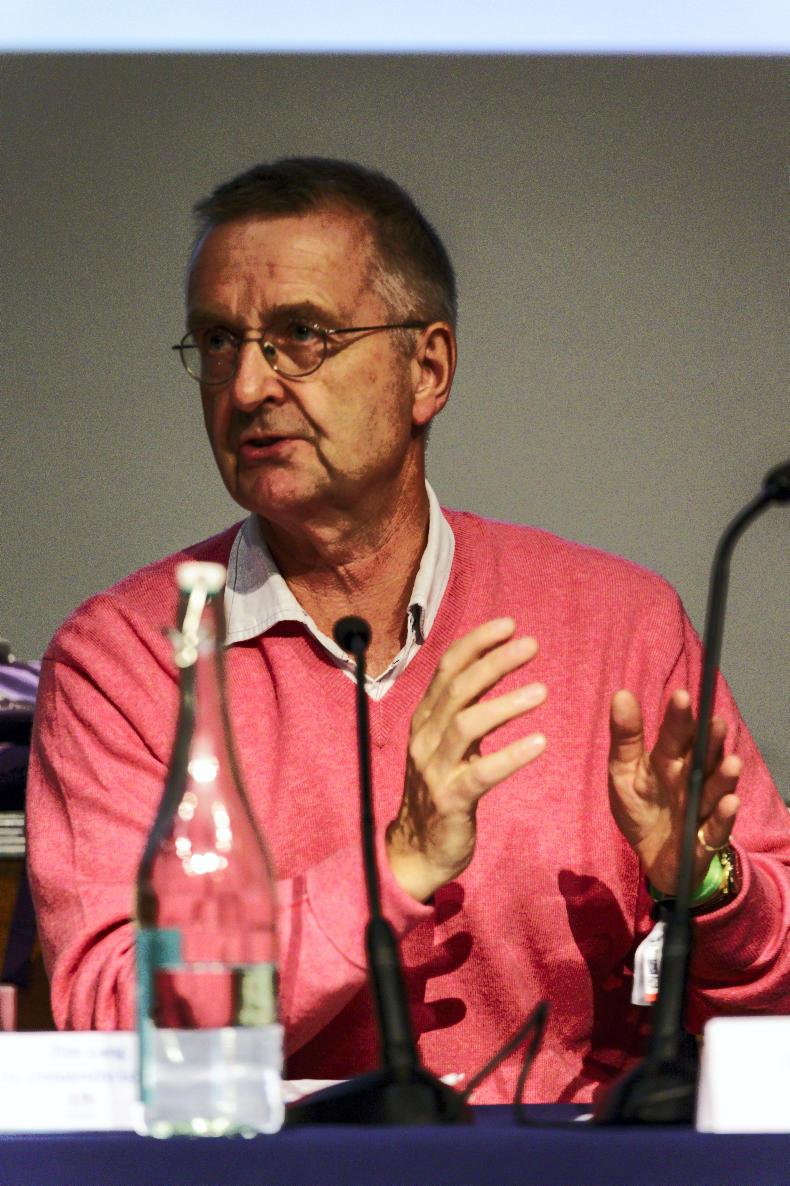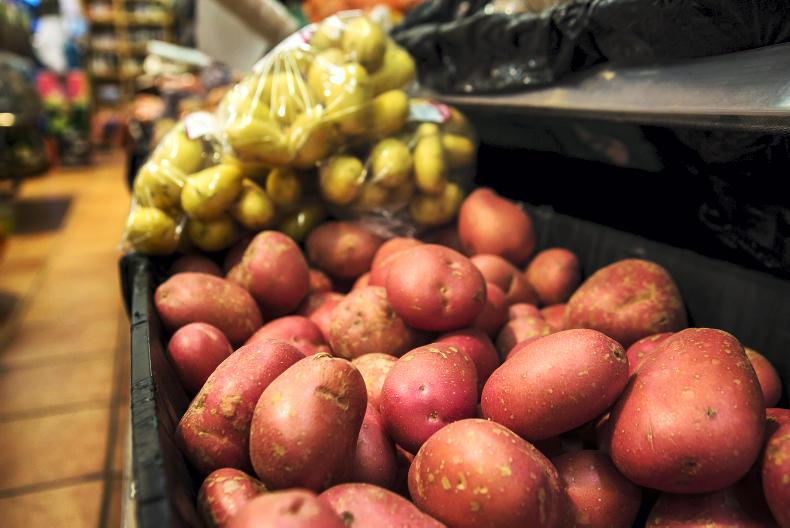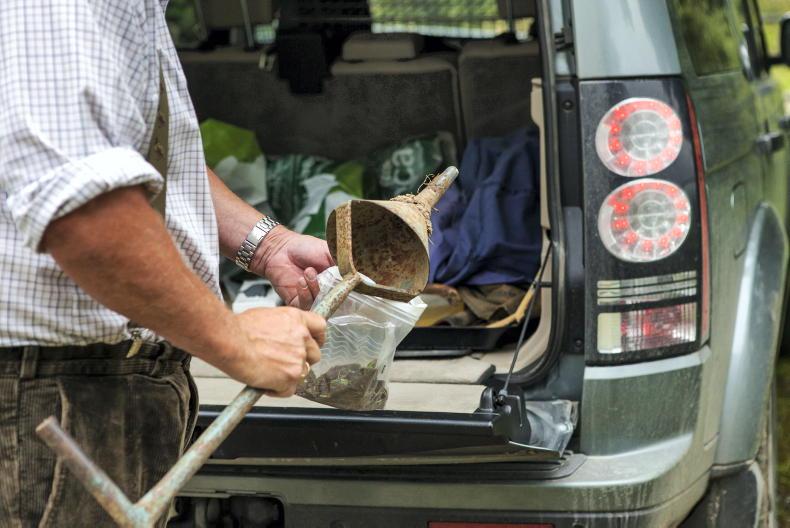A complete overhaul of food policy in the UK is needed to make supply chains more resilient, maintains food policy expert Professor Tim Lang.
“While the supermarkets are full of food, the food system is creaking, it is not in a good shape,” the academic from City University of London said.
In his new book, Feeding Britain: Our Food Problems and How to Fix Them, Lang examines key problems in the web of supply chains that make up the UK’s food system.
This is a very big wake-up call
Some strains have been evident in recent times, from Operation Yellowhammer, the UK’s contingency plans for a no-deal Brexit, to empty supermarket shelves at the start of the coronavirus pandemic.
“This is a very big wake-up call,” warns Lang.
Throughout the book, and in an interview with the Irish Farmers Journal, Lang explains how the UK is not as food-secure as many people think, and he makes a case for changing domestic production to address the issue.
“In a country of 67m people, if half of your food is imported, isn’t that a bit risky if something goes wrong?” Lang asks.

Tim Lang is Professor of Food Policy at City University London.
Self-sufficiency is a measure of the proportion of food consumed within a country which is homegrown. It currently sits around 61% in the UK, but the figure has fluctuated over the past century.
It reached 80% at the height of production-based CAP payments in the early 1980s but has been gradually falling since.
“One of the big lessons that all British political parties learned in World War II was that they should not allow the level of self-sufficiency to go to 33%, which was where it was in 1939.
“By 1945, it was 66%. They doubled it during the war. They did that by rethinking farming, re-emphasising the importance of food labour and taking nutrition and food seriously. We have forgotten those lessons,” Lang said.
Risky strategy
The academic argues that a reliance on food imports is a “risky strategy” which is susceptible to disruption. This could come from global pandemics, weather events, trade wars or malicious attacks.
“It is dead easy to disrupt a food system. Logistics run food systems, it’s satellites in the sky and computers,” Lang said.
He makes the case for increasing food self-sufficiency to around 80% and argues imports should be mainly used for souring food products that cannot be grown locally. Imports should be the icing on the cake, not the cake itself, suggests Lang.
He is fiercely critical of how successive UK governments have had a hands-off approach to food policy
He maintains that cheap food from other countries is effectively an “out of sight, out of mind” approach to issues such as labour standards, food traceability and environmental damage.
The first of 12 “food problems” discussed in his book surrounds how money flows in the food system, something Lang describes as “fundamental unfairness”.
He is fiercely critical of how successive UK governments have had a hands-off approach to food policy. He nicknames it the “leave it to Tesco et al” policy.
“It is no good for farmers. A retailer’s intent is to get a bigger market share and squeeze everyone else, but not to the point of complete collapse. It is not a food policy,” he said.
Official government figures show that UK consumers spent £225.7bn on food, drink and catering during 2018.
How can you expect land use in Britain to improve and start feeding people when farmers gets next to nothing from the huge amounts of money that consumers spend on food?
The amount of money created at each level in the food chain, known as gross value added (GVA) in economics jargon, came to £36.4bn for the catering sector, while retailers received £30.3bn and processors got £31.1bn. Only £10.3bn went to agriculture.
“How can you expect land use in Britain to improve and start feeding people when farmers gets next to nothing from the huge amounts of money that consumers spend on food?” Lang asks.
He said there needs to be more transparency in how money flows in the supply chain and suggests it should be legally binding that primary producers at least double their current GVA, putting it between 10-12% of the total food chain. It would vary for each product, but would be a publicly acceptable policy, argues Lang.
He also makes a case for strengthening competition laws. He gives the example of US telecommunications conglomerate AT&T which was split into smaller companies and asks is it unrealistic to break up the likes of Tesco with its 30% grocery market share.
I am certainly in favour of farming being more sustainable
Lang is also critical of the government’s plans for post-Brexit agricultural policy in England, where payments will only be for environmental measures.
“I am certainly in favour of farming being more sustainable, it’s just they have forgotten about food. The agriculture bill says nothing about food.”
Lang said that the debate surrounding domestic agricultural policy boils down to the question “what is land for?”
“Is it the view? Is it tourism? Is it for food? Is it for biodiversity? Is it for water or sequestering carbon? It is for all of those actually,” he maintains.
Lang acknowledges that many UK farmers are dependent on direct payments to make their businesses viable, but he dismisses the argument that farmers are addicted to subsidies.
“If anyone is addicted, surely it is those after the farmgate who benefit from being sold otherwise unprofitable produce.”
The academic wants rapid expansion in the fruit and vegetable sectors and for domestic food production to become more diverse
However, not all of Lang’s book will make comfortable reading for local farmers. He makes the case for reducing the consumption and production of meat and dairy products.
He argues that too much cropable land is used for grass and too much cereal production goes for feeding “inefficient” livestock. Instead, the academic wants rapid expansion in the fruit and vegetable sectors and for domestic food production to become more diverse.
The book also focuses on wider problems in the food system, ranging from food waste, to diet-related health problems, to social inequalities.
More questions are raised than answered in the book, and Lang acknowledges that. He said his aim is to open a debate among the UK public about what type of food system they want. He certainly provides food for thought.
About Tim Lang
Tim Lang has been Professor of Food Policy at City University London since 2002. He started out as a hill farmer in Lancashire. He has written and co-written many articles and books, and also been a consultant to the World Health Organisation and special adviser to four House of Commons Select Committee inquiries.
A complete overhaul of food policy in the UK is needed to make supply chains more resilient, maintains food policy expert Professor Tim Lang.
“While the supermarkets are full of food, the food system is creaking, it is not in a good shape,” the academic from City University of London said.
In his new book, Feeding Britain: Our Food Problems and How to Fix Them, Lang examines key problems in the web of supply chains that make up the UK’s food system.
This is a very big wake-up call
Some strains have been evident in recent times, from Operation Yellowhammer, the UK’s contingency plans for a no-deal Brexit, to empty supermarket shelves at the start of the coronavirus pandemic.
“This is a very big wake-up call,” warns Lang.
Throughout the book, and in an interview with the Irish Farmers Journal, Lang explains how the UK is not as food-secure as many people think, and he makes a case for changing domestic production to address the issue.
“In a country of 67m people, if half of your food is imported, isn’t that a bit risky if something goes wrong?” Lang asks.

Tim Lang is Professor of Food Policy at City University London.
Self-sufficiency is a measure of the proportion of food consumed within a country which is homegrown. It currently sits around 61% in the UK, but the figure has fluctuated over the past century.
It reached 80% at the height of production-based CAP payments in the early 1980s but has been gradually falling since.
“One of the big lessons that all British political parties learned in World War II was that they should not allow the level of self-sufficiency to go to 33%, which was where it was in 1939.
“By 1945, it was 66%. They doubled it during the war. They did that by rethinking farming, re-emphasising the importance of food labour and taking nutrition and food seriously. We have forgotten those lessons,” Lang said.
Risky strategy
The academic argues that a reliance on food imports is a “risky strategy” which is susceptible to disruption. This could come from global pandemics, weather events, trade wars or malicious attacks.
“It is dead easy to disrupt a food system. Logistics run food systems, it’s satellites in the sky and computers,” Lang said.
He makes the case for increasing food self-sufficiency to around 80% and argues imports should be mainly used for souring food products that cannot be grown locally. Imports should be the icing on the cake, not the cake itself, suggests Lang.
He is fiercely critical of how successive UK governments have had a hands-off approach to food policy
He maintains that cheap food from other countries is effectively an “out of sight, out of mind” approach to issues such as labour standards, food traceability and environmental damage.
The first of 12 “food problems” discussed in his book surrounds how money flows in the food system, something Lang describes as “fundamental unfairness”.
He is fiercely critical of how successive UK governments have had a hands-off approach to food policy. He nicknames it the “leave it to Tesco et al” policy.
“It is no good for farmers. A retailer’s intent is to get a bigger market share and squeeze everyone else, but not to the point of complete collapse. It is not a food policy,” he said.
Official government figures show that UK consumers spent £225.7bn on food, drink and catering during 2018.
How can you expect land use in Britain to improve and start feeding people when farmers gets next to nothing from the huge amounts of money that consumers spend on food?
The amount of money created at each level in the food chain, known as gross value added (GVA) in economics jargon, came to £36.4bn for the catering sector, while retailers received £30.3bn and processors got £31.1bn. Only £10.3bn went to agriculture.
“How can you expect land use in Britain to improve and start feeding people when farmers gets next to nothing from the huge amounts of money that consumers spend on food?” Lang asks.
He said there needs to be more transparency in how money flows in the supply chain and suggests it should be legally binding that primary producers at least double their current GVA, putting it between 10-12% of the total food chain. It would vary for each product, but would be a publicly acceptable policy, argues Lang.
He also makes a case for strengthening competition laws. He gives the example of US telecommunications conglomerate AT&T which was split into smaller companies and asks is it unrealistic to break up the likes of Tesco with its 30% grocery market share.
I am certainly in favour of farming being more sustainable
Lang is also critical of the government’s plans for post-Brexit agricultural policy in England, where payments will only be for environmental measures.
“I am certainly in favour of farming being more sustainable, it’s just they have forgotten about food. The agriculture bill says nothing about food.”
Lang said that the debate surrounding domestic agricultural policy boils down to the question “what is land for?”
“Is it the view? Is it tourism? Is it for food? Is it for biodiversity? Is it for water or sequestering carbon? It is for all of those actually,” he maintains.
Lang acknowledges that many UK farmers are dependent on direct payments to make their businesses viable, but he dismisses the argument that farmers are addicted to subsidies.
“If anyone is addicted, surely it is those after the farmgate who benefit from being sold otherwise unprofitable produce.”
The academic wants rapid expansion in the fruit and vegetable sectors and for domestic food production to become more diverse
However, not all of Lang’s book will make comfortable reading for local farmers. He makes the case for reducing the consumption and production of meat and dairy products.
He argues that too much cropable land is used for grass and too much cereal production goes for feeding “inefficient” livestock. Instead, the academic wants rapid expansion in the fruit and vegetable sectors and for domestic food production to become more diverse.
The book also focuses on wider problems in the food system, ranging from food waste, to diet-related health problems, to social inequalities.
More questions are raised than answered in the book, and Lang acknowledges that. He said his aim is to open a debate among the UK public about what type of food system they want. He certainly provides food for thought.
About Tim Lang
Tim Lang has been Professor of Food Policy at City University London since 2002. He started out as a hill farmer in Lancashire. He has written and co-written many articles and books, and also been a consultant to the World Health Organisation and special adviser to four House of Commons Select Committee inquiries.










SHARING OPTIONS